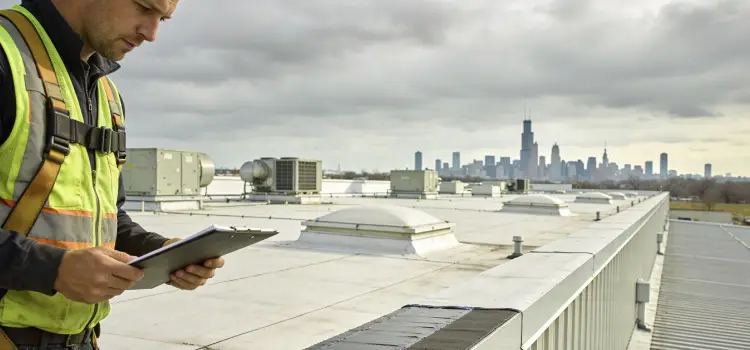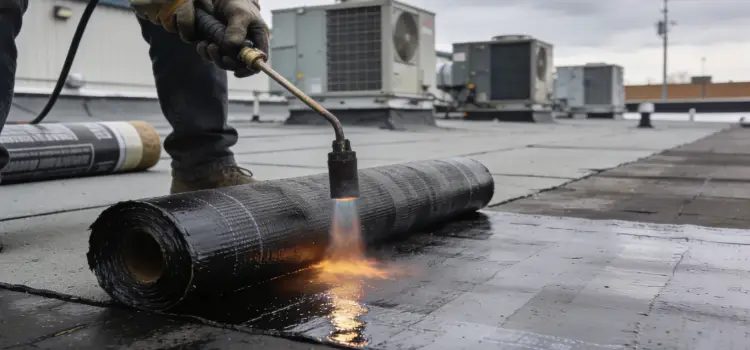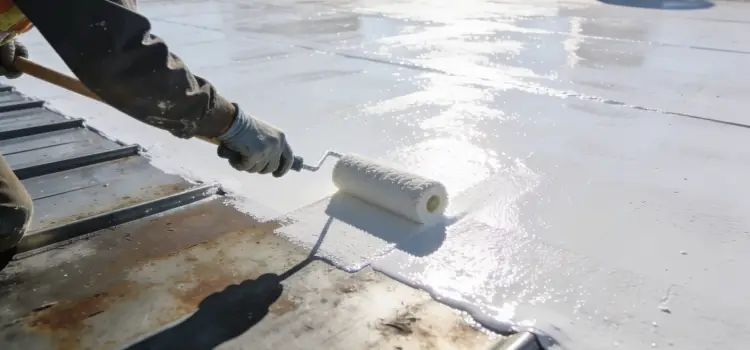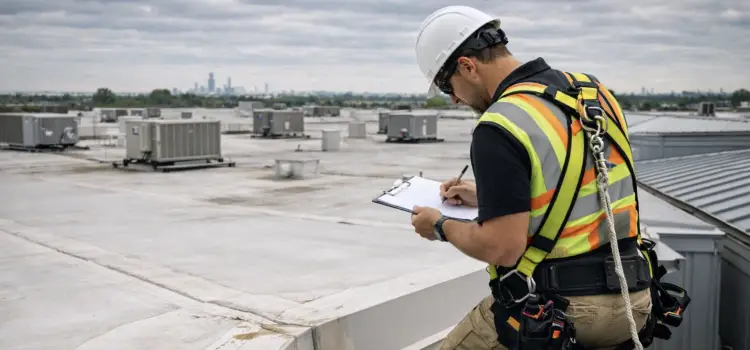By: Boxer Exteriors • Sep 21, 2025 • 10 min. read
Commercial roofs are fundamental in protecting businesses against harsh weather. Explore the various types of commercial roofs in the Chicagoland area and their benefits.

Table of Contents
- 1. Commercial vs. Residential Roofing: What’s the Difference?
- 2. Exploring Types of Commercial Roofs
- 3. Technological Advances Enhancing Roofing Efficiency
- 4. Commercial Roofing Systems in the Chicagoland Area
- 5. Final Considerations for Selecting a Commercial Roof in Chicagoland
- 6. Choosing the Right Commercial Roof
- 7. Commercial Roofing FAQs for Chicagoland Businesses
- 8. Why Choose Boxer Exteriors?
When selecting a commercial roofing system in the Chicagoland area, it’s essential to choose one that not only matches the architectural style but also withstands the region’s variable weather conditions. At Boxer Exteriors, we offer top-tier roofing expertise, ensuring your business benefits from our extensive experience in roof installation, repair, and replacement. Consider starting with a free inspection or estimate to optimize your investment.
Commercial vs. Residential Roofing: What’s the Difference?
Commercial roofs typically differ from residential roofs in several vital aspects, such as size, slope, and materials. Most commercial roofs are flat or have a low slope, making them distinct from the steeper slopes seen in residential housing. This structural distinction is essential as it influences the choice of roofing materials and the installation process.
Flat roofs are prevalent in commercial structures due to their cost-effectiveness and practicality for housing external HVAC systems. On the other hand, low-slope roofs require specific roofing systems like built-up roofing (BUR) or modified bitumen to prevent water accumulation and ensure durability.
Exploring Types of Commercial Roofs
Flat Roofs: These are among the most common choices for commercial buildings in the Chicagoland area. Flat roofs are typically covered with layers of tar and gravel, single-ply membranes (such as EPDM or TPO), or modified bitumen. They are valued for their affordability and ease of maintenance.
Low-Slope Roofs: Options for low-slope commercial roofing include metal panels, which are admired for their durability and weather resistance, and built-up roofing membranes that provide excellent waterproofing capabilities.
Steep Slope Roofs: Less common but visually striking, steep slope roofs can be covered with shingles, tiles, or metal. These roofs shed water and snow more efficiently and can add an aesthetic appeal to a building’s design.
Technological Advances Enhancing Roofing Efficiency
In the evolving field of commercial roofing, technological advancements play a pivotal role. Modern materials and construction techniques have significantly enhanced the energy efficiency, durability, and overall performance of roofing systems. Innovations such as cool roofing and green roofs not only offer superior protection and longevity but also contribute to a building’s energy efficiency, aligning with today’s environmental standards.
Choosing the right commercial roofing system involves understanding the specific needs of your building and aligning them with the most advanced and suitable materials and technologies available. At Boxer Exteriors, we specialize in providing tailored roofing solutions that cater to the unique challenges presented by the Chicagoland area’s climate. Connect with us to learn how our roofing solutions can enhance your business’s operational efficiency and aesthetic appeal.
Commercial Roofing Systems in the Chicagoland Area
As a leader in commercial roofing solutions in the Chicagoland area, we understand that choosing the right roofing system is not just about installation; it’s about making informed decisions that will affect your business for years to come. Here, we detail the prominent types of commercial roofing systems, their specific applications, and inherent advantages, ensuring you select a roofing solution that aligns with your building’s needs and budget.
Single-Ply Roofing: Flexibility and Efficiency
Types and Features:
- TPO (Thermoplastic Polyolefin): Renowned for its heat-reflective properties and energy efficiency.
- PVC (Polyvinyl Chloride): Offers superior resistance to chemicals and is ideal for restaurants and businesses that emit oils and fats.
- EPDM (Ethylene Propylene Diene Monomer): Distinguished by its durability and versatility, suitable for a variety of climates.
Materials and Installation: These systems generally involve single-ply membranes that are either mechanically fastened, fully adhered, or ballasted.
Pros:
- Excellent weather resistance
- Lightweight and adaptable to different roof decks
- Energy-efficient materials that can significantly reduce heating and cooling costs
Cons:
- Susceptibility to punctures
- Requires professional installation to ensure seams are properly sealed
Lifespan and Cost in Illinois: Typically ranges from 20 to 30 years. Costs vary based on material choice and installation method, but they are generally considered a cost-effective option for large commercial roofs.

Modified Bitumen Roofing: Tailored for High-Traffic Roofs
Features and Installation: Composed of reinforced roof fabrics and bitumen, applied in layers that offer enhanced tensile strength.
Advantages:
- High durability
- Suitable for buildings with heavy roof traffic
- Reflective coatings available to improve energy efficiency
Disadvantages:
- Installation involves hot torches and fumes, requiring skilled labor and safety precautions
- More vulnerable to weathering compared to more modern materials
Ideal Use: Best for buildings where the roof is accessed frequently for maintenance or other activities.
Lifespan and Cost in Illinois: Offers a lifespan of 15 to 20 years. Costs are moderate, considering the durability.
Built-Up Roofing (BUR) Systems: The Traditional Choice
Composition and Method: Consists of multiple layers of tar and gravel, creating a thick, durable covering.
Pros:
- Excellent waterproofing properties
- High resistance to foot traffic
- Long lifespan with proper maintenance
Cons:
- The weight of the system requires strong structural roof support
- Installation can be slow and messy
Ideal Use: Preferred for buildings with flat roofs where future foot traffic is expected.
Lifespan and Cost in Illinois: Can last up to 30 years or more. It is one of the more affordable options in terms of lifecycle cost.
Metal Roofing: Longevity and Aesthetics
Materials and Construction: Typically made from corrugated galvanized steel, but can also include aluminum, tin, or copper.
Advantages:
- Exceptionally durable and fire-resistant
- Can be designed to mimic other materials like tiles or shingles
- Almost maintenance-free and highly sustainable
Disadvantages:
- Initial costs are higher than other roofing types
- Requires precise installation to avoid issues with thermal movement
Ideal for: Businesses looking for a long-term investment that offers both functionality and style.
Lifespan and Price in Illinois: Lifespans extend beyond 50 years, with costs varying significantly based on the metal used.
Liquid Applied Roofing: Seamless Protection
Features and Application: Liquid roofing involves the application of a monolithic, fully bonded liquid-based coating to the roof. It is applied over existing roofing systems, creating a seamless layer.
Advantages:
- Excellent waterproofing capabilities
- Highly flexible; adjusts to temperature changes and building movements
- Cost-effective for repairs and to extend the life of existing roofs
Disadvantages:
- Application is weather-dependent, requiring dry conditions
- Lifespan is shorter compared to other roofing systems
Ideal Use: Suitable for complex roof layouts with multiple protrusions and details.
Lifespan and Cost in Illinois: Generally offers a lifespan of 10-20 years. It’s a budget-friendly option particularly for restoration projects.

Roof Coating Systems: Enhancing and Protecting
Composition and Method: Coatings are applied directly to the roof’s surface to protect and extend the life of roofing materials like metal, asphalt, or single-ply membranes.
Advantages:
- Increases UV and weather resistance
- Improves roof’s aesthetic appearance
- Reduces cooling costs by reflecting sunlight
Disadvantages:
- Not suitable as a standalone roofing system
- Periodic reapplication is needed to maintain effectiveness
Ideal Use: Best for maintenance managers looking to improve energy efficiency and extend the roof’s service life without a complete replacement.
Lifespan and Price in Illinois: Can add 10-15 years to the existing roof system. Costs are low compared to full roof replacement, making it an economical choice for budget-conscious owners.
Green Roofs: Eco-Friendly and Sustainable
Features and Installation: Consist of a waterproof membrane covered by soil and vegetation. Requires a robust structural base to support the weight of the system.
Advantages:
- Reduces heat absorption, lowering energy costs
- Manages stormwater runoff, reducing the burden on urban sewer systems
- Increases biodiversity and adds aesthetic value to buildings
Disadvantages:
- High initial installation and maintenance costs
- Requires a strong structural support system
Ideal Use: Excellent for urban settings where environmental impact and sustainability are priorities.
Lifespan and Cost in Illinois: Lifespans can vary widely, but with proper maintenance, green roofs can last 30 years or more. They are among the most expensive roofing options due to their complex installation and maintenance needs.
Asphalt Shingles: Versatile and Widely Used
Description and Key Features: Commonly used for steep-sloped commercial buildings; offers versatility in colors and styles.
Advantages:
- Economical and easy to install
- Suitable for various architectural styles
- Provides reliable protection with easy maintenance
Disadvantages:
- Shorter lifespan compared to other commercial roofing materials
- Susceptible to wind and storm damage
Ideal Use: Appropriate for smaller commercial buildings or those with steep roofs mimicking residential styles.
Lifespan and Cost in Illinois: Typically lasts 15-30 years depending on the quality. It’s one of the most cost-effective roofing options available.
![]()
Spray-On Silicon: Innovative and Efficient
Description and Application: This system involves spraying a silicone layer directly onto an existing roof, creating a seamless barrier that protects against water and weather damage.
Advantages:
- Waterproof and highly reflective, which helps reduce cooling costs
- Adapts to nearly any existing roof surface
- Quick and easy application with minimal disruption
Disadvantages:
- Higher initial cost compared to other coatings
- May require frequent re-coatings depending on environmental conditions
Ideal Use: Perfect for buildings requiring a quick enhancement of their current roof’s water and UV resistance without a complete overhaul.
Lifespan and Cost in Illinois: Typically lasts between 10-15 years. The cost is moderate, offering a balance between performance and expense.
Photovoltaic (PV) Solar Panels: Merging Energy Efficiency with Functionality
Features and Installation: These systems integrate solar panels with roofing materials, either mounted on top of the roof or integrated into the roofing material itself.
Advantages:
- Provides a source of renewable energy, reducing electricity costs
- May be eligible for tax benefits and incentives
- Increases property value by upgrading the building’s green credentials
Disadvantages:
- Requires significant upfront investment
- Needs a roof with appropriate structural support and alignment for optimal sun exposure
Ideal Use: Best suited for commercial properties with ample roof space that receive a lot of sunlight and where the owner is committed to long-term sustainability efforts.
Lifespan and Cost in Illinois: Solar panel systems can last 25 years or more. Despite the high initial cost, the long-term savings on energy bills and potential tax incentives can make it a financially viable option over time.
Each roofing option comes with its unique set of features and considerations, from innovative energy solutions like PV solar panels to practical and quick fixes like spray-on silicon. By aligning your specific needs with the characteristics of these roofing types, you can ensure that your investment not only enhances the functionality and appearance of your building but also contributes to your long-term business goals and sustainability efforts in the Chicagoland area.
Final Considerations for Selecting a Commercial Roof in Chicagoland
As you approach the decision of selecting a commercial roof for your Chicagoland area property, understanding the role of insulation, energy efficiency, and maintenance requirements is crucial. Boxer Exteriors, your dedicated local expert, offers comprehensive services tailored to enhance and protect your investment.
A well-insulated roof is essential for reducing energy costs and maintaining temperature stability inside your building. Cover boards add an extra layer of protection against mechanical damage and fire. These components are integral to prolonging the life of your roofing system, especially in Illinois’s variable climate.
Energy-efficient roofing systems are not just beneficial for reducing operational costs; they also contribute to a smaller environmental footprint. Reflective roofing materials such as TPO and PVC can deflect sunlight and heat, significantly lowering air conditioning needs and enhancing the comfort of your commercial space.
Regular maintenance extends the lifespan of your roof and prevents minor issues from becoming costly repairs. At Boxer Exteriors, we provide detailed roof inspections and customized maintenance plans to ensure your roof remains in optimal condition, safeguarding your business and property.
Choosing the Right Commercial Roof
Choosing the right roof involves balancing several factors, including durability, cost, architectural style, and specific business needs. The complexity of this decision underscores the importance of professional guidance.
Partnering with seasoned professionals like Boxer Exteriors ensures that every aspect of your roofing project is handled expertly. From selecting materials to understanding warranty options, our team is equipped to guide you through the process, ensuring your roofing choice meets all functional and aesthetic requirements.

Commercial Roofing FAQs for Chicagoland Businesses
What are the most common commercial roofing types in Chicagoland?
The most common commercial roofing types in Chicagoland include flat roofing systems, metal roofs, rubber roofing, and PVC roofing systems. Each roof type offers distinct benefits depending on the building size and design. Flat roofing systems are widely used for commercial and industrial buildings due to their low maintenance and cost-effectiveness, while metal roofing provides proven performance and longevity. PVC and rubber roofing are often chosen for their durability, reflective materials, and energy-saving properties.
Why do commercial buildings often use flat roofing systems?
Commercial buildings frequently use flat roofing systems because they are practical, budget-friendly, and adaptable to various commercial roofing needs. Flat roofs are ideal for housing HVAC units and other equipment, making them efficient for industrial buildings. These systems also allow easy roof repair and roof maintenance. Roofing contractors in the Chicago area often recommend flat roofing systems for their long lifespan, cold applied or hot mopped installation options, and ability to handle heavy foot traffic when designed with top quality materials.
What options are available for commercial roof repair in the Chicago area?
Commercial roof repair options in the Chicago area vary depending on the roof type and damage. Roofing contractors often provide patching for rubber roofing, seam sealing for PVC roofing systems, or replacing worn sections of metal roofing. Roof coating systems can also extend a roof’s service life by adding reflective materials that reduce heat absorption. Building owners should schedule regular roof maintenance and request a free estimate today to prevent small issues from escalating into costly structural repairs.
Which commercial roofing materials are best for energy efficiency?
For energy efficiency, PVC roofing systems and TPO membranes are popular commercial roofing materials. Both use reflective materials that reflect sunlight, lowering cooling costs in large commercial properties. Metal roofs also provide low maintenance and excellent thermal performance. Roofing manufacturers design these materials to meet strict code requirements in the Chicago area, ensuring proven performance in harsh weather. Building owners often choose these commercial roofing options to improve comfort, reduce energy expenses, and enhance long-term sustainability.
How do I determine my commercial roofing needs?
Determining your commercial roofing needs starts with assessing building size, roof slope, and code requirements specific to the Chicago area. Roofing contractors evaluate whether a sloped roof or flat roofing system suits your property best, while also considering durability and maintenance expectations. For example, industrial buildings often require PVC or rubber roofing for proven performance, while smaller properties may use asphalt shingles. A free estimate today from experienced roofing contractors helps building owners choose top quality materials for long-term reliability.
What is the most durable commercial roof type?
Metal roofing is considered the most durable commercial roof type for Chicago area businesses. Metal roofs offer proven performance, lasting more than 50 years with minimal roof maintenance. They withstand severe weather, provide excellent fire resistance, and can be mechanically attached for superior strength. Roofing manufacturers also offer styles that mimic traditional shingles or tiles, combining aesthetics with functionality. While initial installation costs may be higher, the investment pays off with long service life, low maintenance, and top quality materials.
Why should commercial properties schedule regular roof maintenance?
Regular roof maintenance is vital for commercial properties to extend roof life, reduce repair costs, and maintain compliance with code requirements. Flat roofing systems, PVC roofing systems, and metal roofs all require periodic inspections to catch issues early. Roofing contractors can perform roof repair such as sealing, re-coating, or replacing worn areas. Building owners benefit from maintenance plans that ensure top quality materials continue delivering proven performance. Preventive care protects investments and keeps commercial roofing needs under control in the Chicago area.
What commercial roofing options are available for sloped roofs?
Sloped roofs on commercial buildings can be covered with metal roofing, asphalt shingles, or tile, depending on budget and style. Metal roofs are durable and low maintenance, while shingles are affordable and versatile. Roofing contractors in the Chicago area often recommend reflective materials for sloped roof projects, ensuring energy efficiency and compliance with code requirements. Building owners benefit from a wide range of commercial roofing options that combine aesthetics with functionality while addressing unique commercial roofing needs.
How do industrial buildings benefit from PVC roofing systems?
Industrial buildings benefit from PVC roofing systems because they are chemically resistant, mechanically attached for strength, and highly reflective. PVC roofing reflects sunlight, lowering cooling costs and improving energy efficiency in large facilities. Roofing contractors often recommend PVC for properties like restaurants or factories where oils and chemicals are present. With top quality materials and proper installation, PVC roofing offers low maintenance, proven performance, and long-term durability, making it one of the most reliable commercial roofing options in the Chicago area.
How can building owners choose the right roof type in the Chicago area?
Building owners should evaluate their roof type options based on building size, slope, and local code requirements. For flat roofing systems, rubber roofing or PVC roofing systems provide reliable, low maintenance solutions. For sloped roofs, metal roofing offers proven performance and aesthetics. Roofing contractors can provide a free estimate today to help assess commercial roofing needs, recommend top quality materials, and ensure compliance. Considering factors like reflective materials, hot mopped vs. cold applied systems, and long-term roof maintenance ensures the best decision.
Why Choose Boxer Exteriors?
Boxer Exteriors stands as a leader in commercial roofing across Wheaton and the surrounding Chicagoland area. We pride ourselves on delivering high-quality roofing solutions, crafted through years of experience and dedicated service. Our commitment to excellence is evident in every project we undertake, from new installations to complex repairs.
Don’t wait for a roofing emergency to take action. Contact Boxer Exteriors at 630-570-0269 or via email at info@boxerexteriors.com to schedule a free consultation or estimate. Servicing Wheaton, Glen Ellyn, Naperville, and beyond, we are here to provide top-tier roofing solutions tailored to the unique needs of your commercial property. Trust us to protect and enhance your investment with unmatched professionalism and expertise.

I highly recommend Boxer Exteriors
Great customer service. Dawn and her team went above and beyond. I highly recommend!!!!!💪🏻💪🏻
The work to the house was handled over two days, one for the roof and another for the siding. No incidents and the end result was seamless. Really came together in the end and have gotten regular compliments on the final outcome.
Overall, couldn’t be happier with my decision to go with Boxer. Professional, trust-worthy, and just overall really good people!

